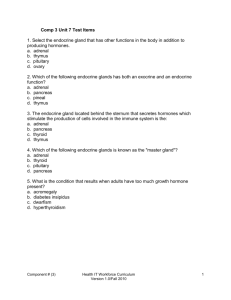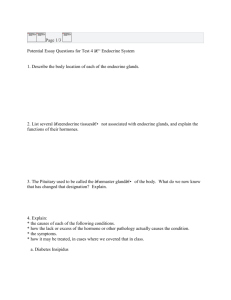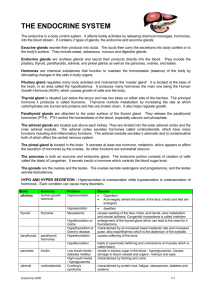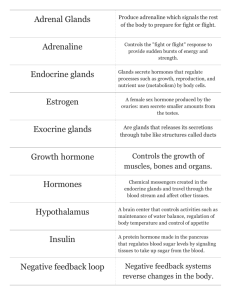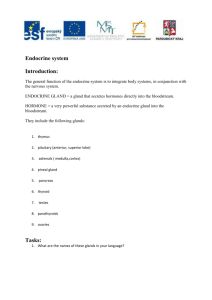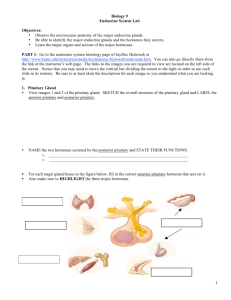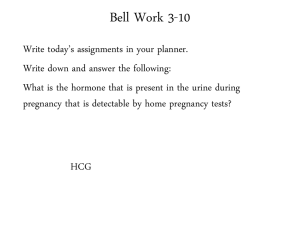Endocrine System
advertisement
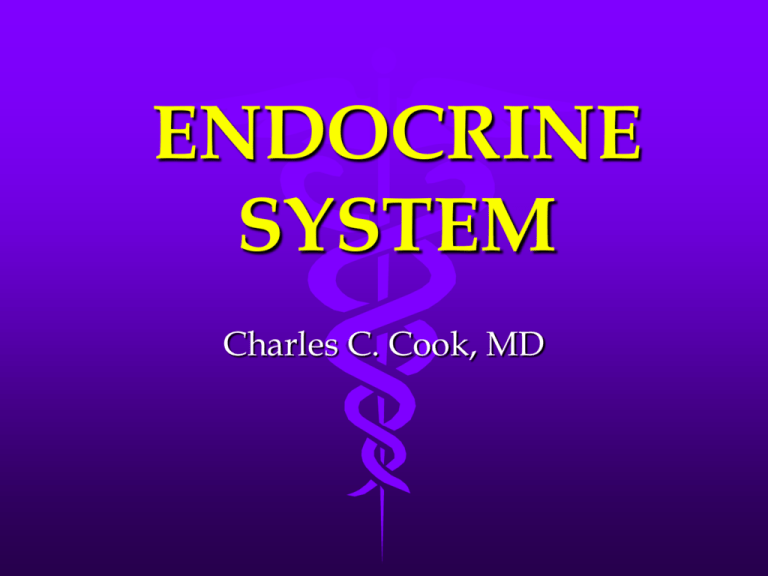
ENDOCRINE SYSTEM Charles C. Cook, MD ENDOCRINE SYSTEM Endocrine system is complex and illness associated with it are sometimes very difficult to diagnose. Regulating the functions of the Human Body Nervous System: Biological communication system Endocrine System: Uses biochemicals called hormones that travel in body fluids and act as chemical messengers to their target cells Endocrine System A system of glands that function in the coordination of body activities through chemical messengers Endocrine Glands Have no ducts Secrete hormones –into extracellular fluids –diffuse into the bloodstream Endocrine Glands Pituitary gland Thyroid gland Parathyroid glands Adrenal glands Pancreas Exocrine Glands Secrete products through ducts that lead to the lumen of an organ, body surface or body cavity Example: – Sweat glands – Salivary glands – Liver and Gall bladder Hormones and Negative Feedback Hormones Chemical messenger –Endocrine gland –Blood or body fluids Target: specific site on a cell, tissue, organ or organ system with hormone binds Hypersecretion: greater than normal Hyposecretion: less than normal Hormones Chemical released from an endocrine gland that Affects function of a target cell Diffuses into the blood Carried through the body Act on cells that have specific receptor (hormone can attach) Negative Feedback Secretion of most hormones by endocrine gland Mechanism for –Maintaining stable amount of hormone in the blood stream Negative Feedback Example Thyroid hormone falls below normal –Hypothalamus detects the decrease Hypothalamus signal –Anterior pituitary gland to secrete TSH TSH cause the thyroid to make & secrete more TH (Thyroxine) Level of TH in the blood returns to normal Higher concentration of TH shuts off the signal both hypothalamus & pituitary gland that led to Increase in secretion of TH Functions of the Endocrine System Help to control internal environment Respond to marked changes Helps with growth and development Helps with reproduction process Regulate metabolism –Maintain homeostatasis –F/E and Acid Base Balance The Major Endocrine Organs Major Endocrine Organs Hypothalamus Pituitary Glands – Anterior lobe – Posterior lobe Thyroid Glands Parathyroid Glands Adrenal Glands – Adrenal cortex – Adrenal medulla Pancreas Hypothalamus Middle of the brain near floor of the cranial cavity Connection between nervous and endocrine system Sensory information & signals to pituitary glands to secrete or not secrete hormones Pituitary Glands The Master Gland Base of the brain (1cm in dia) In the sella turcisa Bony pocket of the cranial cavity Has an Anterior and Posterior Lobe 75% Total Wt. Anterior Pituitary Gland Releases 7 major hormones Growth Hormone (GH) Prolactin (PRL) Thyroid Stimulating Hormone (TSH) Melanocyte Stimulating Hormone (MSH) Adrenocorticotrophic Hormone (ACTH) Follicle Stimulating Hormone (FSH) Lutenizing Hormone (LH) Anterior Pituitary Hormones GH- mainly promotes the lengthwise growth of long bones (Somatotropic) Prolactin- stmulates breast development and lactation after childbirth TSH- stimulating the thyroid gland (Thyroxine & Triiodothyronine) Anterior Pituitary Hormones ACTH- stimulates the adrenal cortex to secrete cortisol LH- regulates the functions of estrogen, progesterone and testosterone production FSH- regulates the functions of the sperm and egg production Posterior Pituitary Gland Nerve fiber (impulses) Releases two hormones –Antidiuretic hormone (ADH) –Oxytocin (OT) Thyroid-Stimulating Hormone a.k.a. TSH Function –Stimulates the thyroid gland to secrete more of the thyroid hormone (Thyroxine) Adrenocorticotropic Hormone a.k.a ACTH Stimulate the adrenal cortex to manufacture & secrete its hormones Mostly cortisol –but also other hormones Regulates Cortisol levels in the blood are Lower than normal Hypothalamus stimulates the anterior pituitary gland to secrete ACTH Regulates Cortisol levels in the blood is Normal or higher than normal Cortisol inhibits the hypothalamus from stimulating the secretion of ACTH Inhibits the anterior pituitary from secreting ACTH (-) feedback The Thyroid Gland Thyroid Gland Location in the front of the neck around the –Larynx –Trachea Main hormone of the thyroid gland is –Thyroxine and Calcitonin Thyroxine Regulates the metabolic rate of the whole body Levels of thyroxine –Increased: speed up metabolic rate –Decreased: slows metabolic rate Thyroid Disorders Goiter Hyperthyroidism –Excessive secretion Hypothyroidism –Inadequate secretion Goiter Enlarged thyroid gland –tells you something is wrongs –Doesn’t tell you what is wrong Hyperthyroidism Excessive secretion of thyroxine All sign & symptoms are rated to increase in metabolic rate -increase heart -increase body temp -fatigue -weight loss Hyperthyroidism Produces -elevated metabolic rate -restlessness -overeating -eyes protrude -thyroid glands enlarged (goiter) Hypothyroidism Inadequate secretion of Thyroxine All signs & symptoms are related to a decrease in the metabolic rate –decrease heart & respiratory rate Hypothyroidism –constipation & weigh gain – decrease body temperature intolerance of cold Hypothyroidism Cretinism Symptoms -stunted growth -abnormal development -low body temp -sluggishness Parathyroid Glands Located posterior surface of the thyroid gland There’s 4 structure –2 superior glands –2 inferior glands Parathyroid hormone Regulate calcium level in the blood When PTH secreted –Increase blood calcium levels –Decrease blood phosphate levels Affects the bones, kidneys, and intestine The Adrenal Gland Adrenal Glands Located atop of each kidney Adrenal medulla- is the center (core) layer portion Adrenal cortex- is the outer layer portion Adrenal Cortex Three layers that synthesize corticoids Outer (core) layer Three adrenal hormones –Aldosterone –Glucocorticoids –Adrenal Androgens Aldosterone Regulates mineral electrolytes Kidneys to conserve sodium & water excrete potassium If blood pressure falls- kidney indirectly stimulate aldosterone secretion Glucocorticoids Plays a role in maintenance of blood pressure Influences Glucose Metabolism Adrenal Androgens –Minimal levels of testosterone are produced Adrenal Medulla Secretes 2 hormones -epinephrine -norepinephrine 80% is epinephrine Prepares the body for –Action –Stress Sympathetic Nerve System -flight or fight -Adrenaline rush Resulting In: –increase heart rate blood pressure respiration blood sugar level –decreased digestive rate The Pancreas Pancreas Location- behind the stomach Exocrine- secretes digestive juice (pancreatic duct) into small intestine Endocrine- Islets of Langerhans Hormones Insulin: Promotes the transport of glucose from the blood into the cells Glucagon: Stimulates the release of the stored glucose from the liver into the blood Diabetes Mellitus Metabolic levels are disorder; blood glucose –CHRONICALLY HIGH Type I- can not produce enough insulin Type II- insulin resistance Signs and Symptoms The four (P’s) (Polyuria) Frequent urination (Polydipsa) Chronic thirst (Polyphagia) Chronic hunger (Poor wt maintenance) Weight problems Type I –destruction of the beta cells Type II –decrease or no response on the target cells (mostly liver, skeletal, muscle, and adipose tissue) –is almost always obese Gonads/Sex Glands Ovaries and Testes – Male and female gamete producing glands Testes – Located scrotal sac – Produce Testosterone Ovaries – Located in pelvic region – Produces estrogen and progesterone Thymus Gland Cortex and Medulla region –Largely composed of lymphocytes Hormone produced Thymosin –Activate immune system –Production of certain lymphocytes –Important role in immunity Endocrine Glands Digestive glands – Stomach and small intestine Erythropoietin – Secreted by the kidneys Atria Natriuretic Factor (ANF) – Secreted by the cell in the walls of the atria – ANF is an antagonist – Decreases blood volume That’s It!!!!!!


